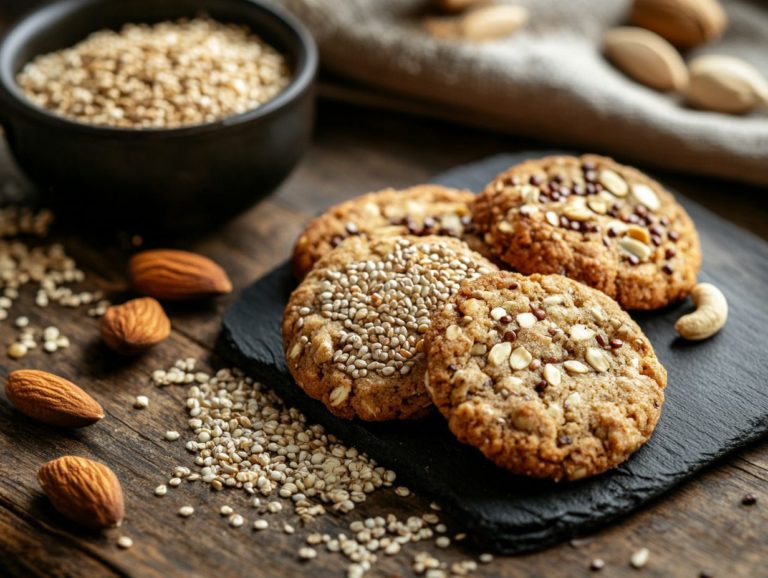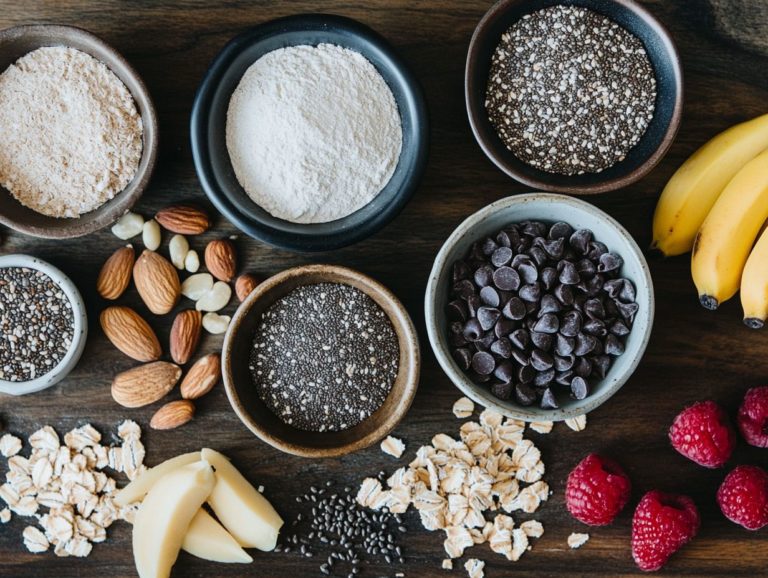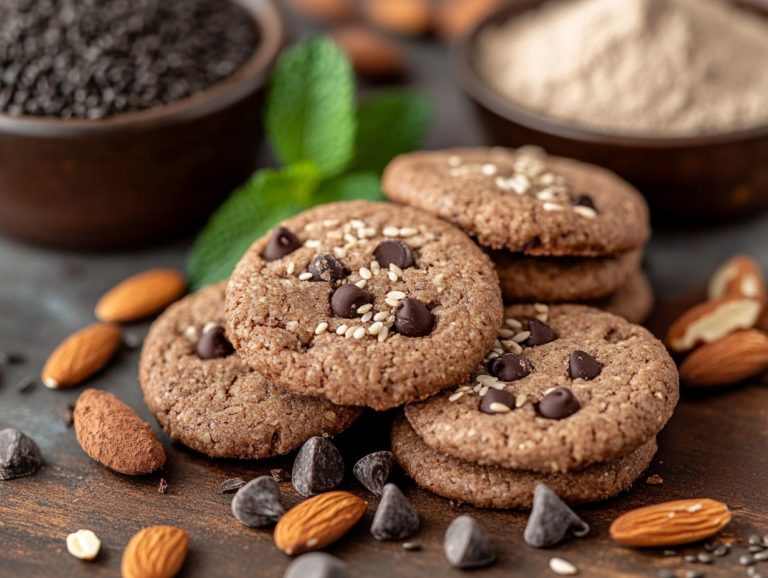5 Must-Try Ingredients for Plant-Based Cookies
Contents
- Transform Your Cookie Recipes with These 5 Plant-Based Ingredients
- Key Takeaways:
- 1. Aquafaba (Chickpea Water)
- 2. Flaxseed Meal
- 3. Coconut Oil
- 4. Almond Flour
- 5. Coconut Sugar
- Why Use Plant-Based Ingredients in Cookies?
- What Are the Health Benefits of Using Plant-Based Ingredients?
- How Can These Ingredients Be Substituted in Traditional Cookie Recipes?
- What Are Some Delicious Plant-Based Cookie Recipes to Try?
- What Are Some Tips for Baking with Plant-Based Ingredients?
- How Can Plant-Based Cookies Be Made More Nutritious?
- Frequently Asked Questions
- What are 5 must-try ingredients for plant-based cookies?
- Why use almond flour in plant-based cookies?
- What makes coconut oil a great choice for plant-based cookies?
- Why is maple syrup a better sweetener for plant-based cookies?
- What role does flaxseed meal play in plant-based cookies?
- Can any plant-based milk be used in cookies?
Transform Your Cookie Recipes with These 5 Plant-Based Ingredients
Get ready to elevate your cookie-making game! Discover five fantastic ingredients that will transform your traditional cookie recipes into delicious, easy-to-make, plant-based treats.
From the enchanting whipped wonders of aquafaba to the nutty richness of almond flour, these ingredients not only elevate flavor and texture but also provide a host of health benefits, making them perfect for soft, chewy cookies.
Uncover the art of substituting these ingredients and experiment with delectable recipes. Whether it’s a simple, straightforward recipe, a one-bowl recipe, or a new twist on the most popular cookies, you ll find inspiration here!
Key Takeaways:
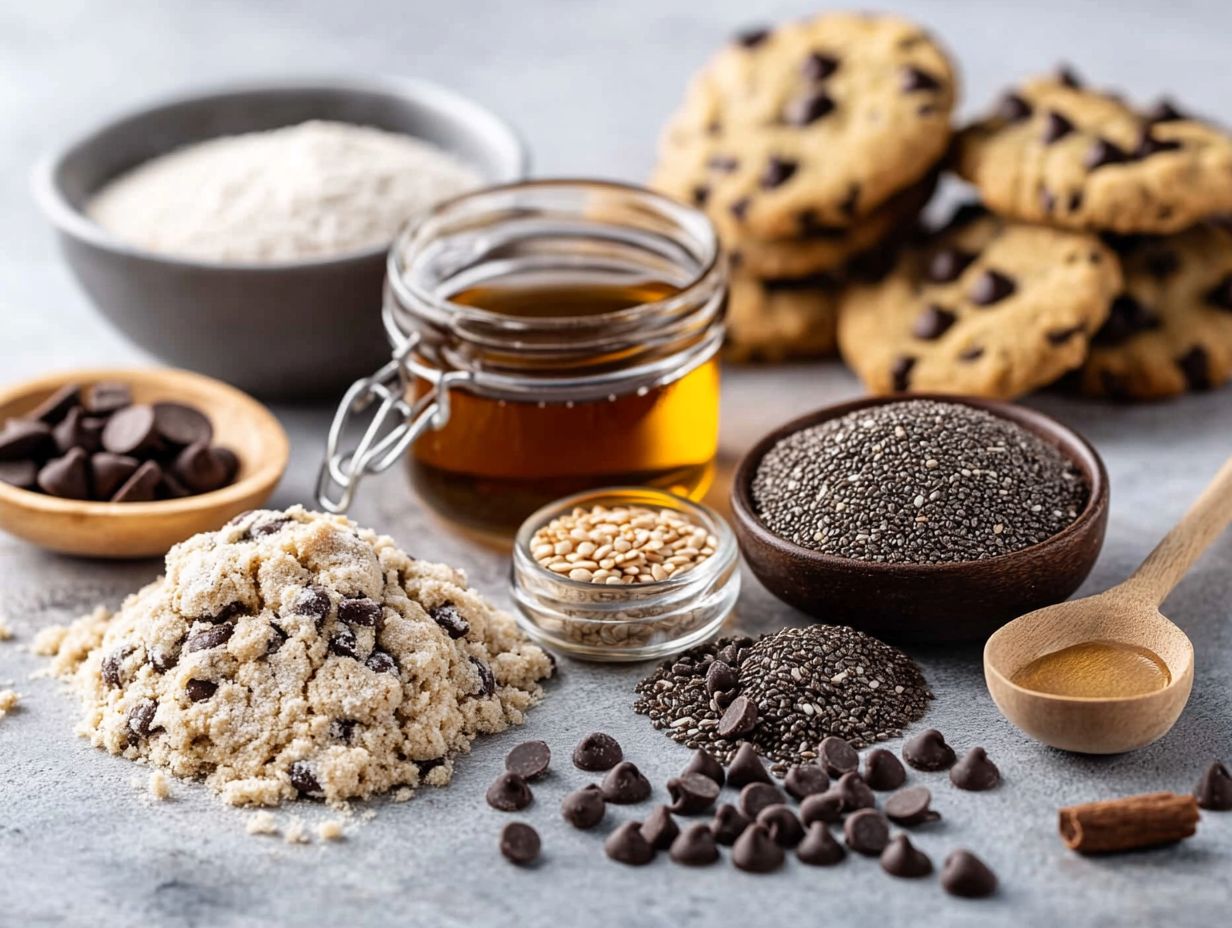
- Aquafaba, a vegan egg substitute, adds moisture and structure to cookies.
- Flaxseed meal is a rich source of omega-3s and can bind ingredients together.
- Replacing butter with coconut oil adds a rich flavor and helps cookies stay moist and chewy.
1. Aquafaba (Chickpea Water)
Aquafaba, the liquid derived from cooked chickpeas, has emerged as a remarkable egg white substitute, especially when it comes to baking those delightful vegan chocolate chip cookies that are soft, chewy, and perfect every time no traditional eggs or dairy required. This versatile ingredient, often referred to as chickpea water, is not only easy to make but also an essential player in crafting the finest vegan cookies, contributing to that cookie dough perfection every cookie enthusiast craves.
Aquafaba is special because it can mimic the emulsification and foaming capabilities of eggs. When whipped, this wonder ingredient transforms into a light, airy texture, making it ideal for aerating cookie dough and ensuring it rises beautifully during baking.
If you’re eager to explore its potential, simply replace each egg in your favorite chocolate chip cookie recipe with three tablespoons of aquafaba. For the best results, whip the aquafaba until it forms stiff peaks, then gently fold it into your dough. This technique will elevate your cookies texture, delivering that perfect balance of softness and chewiness that everyone simply adores.
2. Flaxseed Meal
Flaxseed meal is an extraordinary ingredient in vegan baking, particularly when you’re whipping up a batch of vegan chocolate chip cookies. It serves as a brilliant substitute for a flax egg, binding your ingredients together while imparting a delightful nutty flavor that elevates the overall taste of your cookies.
To create a flax egg, mix one tablespoon of flaxseed meal with two and a half tablespoons of water. Let it rest for about 5-10 minutes until it thickens into a perfect binding agent. This simple addition enhances the texture of your cookies while introducing a host of health benefits. Rich in omega-3 fatty acids, flaxseed meal supports heart health and boasts anti-inflammatory properties.
It can also be a superb alternative to traditional brown sugar in certain recipes, adding a subtle sweetness while keeping your baked goods moist and wholesome. By incorporating flaxseed meal into your cookie dough, you can enjoy a delicious treat that not only satisfies your sweet tooth but also nourishes your body. Consider using non-dairy chocolate chips for an entirely plant-based cookie experience.
3. Coconut Oil
Coconut oil has become a staple in vegan baking as a healthier fat alternative. It often steps in for vegan butter.
It’s a key ingredient in effortless chocolate chip cookies. These cookies are as delightful as they are nutritious.
For those looking to make chocolate chip cookie bars, coconut oil provides the right texture and flavor.
This versatile oil comes in several varieties, including refined, unrefined, virgin, and extra virgin. Each presents its own unique flavor profile that can elevate your baked goods.
If you prefer a more traditional cookie flavor, refined coconut oil is your go-to with its neutral taste.
On the other hand, if you’re looking to add a hint of the exotic, virgin coconut oil offers a subtle coconut aroma that can transform your treats.
Coconut oil is also a suitable alternative. It works well for those who require a gluten-free flour option.
When baking, it’s essential to grasp the solid-to-liquid state of coconut oil for seamless incorporation into your dough. Accurate measurement is key to achieving the perfect cookie texture.
Plus, with the added health benefits of coconut oil like its good fats and potential antimicrobial properties these cookies become a guilt-free indulgence that can truly delight the senses.
Don’t forget to add a pinch of baking soda salt to enhance the flavor and texture even more.
4. Almond Flour
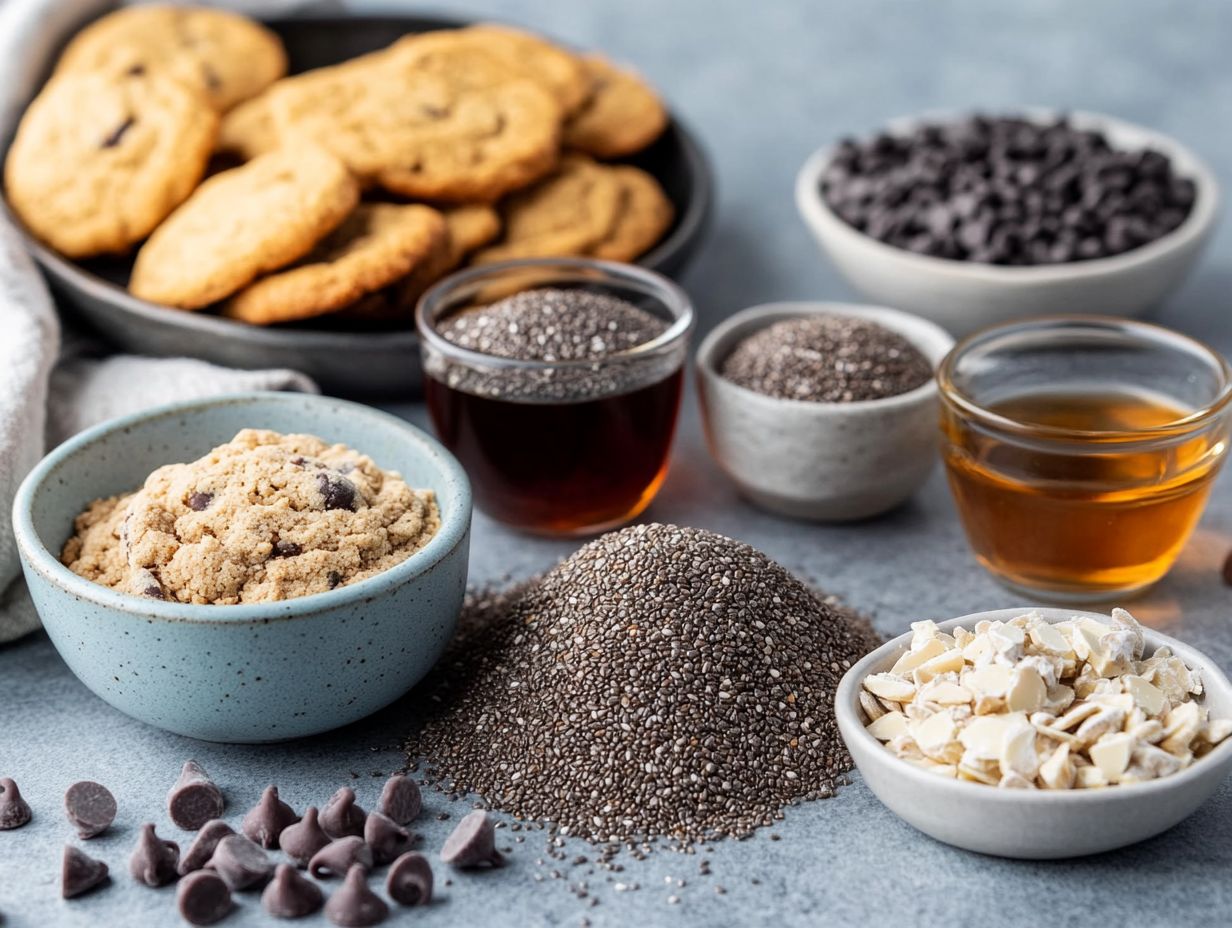
Want to indulge in healthy, plant-based cookies? Almond flour is your secret ingredient.
Almond flour serves as an exceptional gluten-free flour alternative. It infuses your vegan chocolate chip cookies with a delightful nutty flavor and a moist texture.
It s a go-to for anyone looking to enjoy cookies without sacrificing taste or quality.
Almond flour can also be used in a one-bowl recipe to keep the preparation simple.
What makes almond flour stand out is its wealth of healthy fats, protein, and fiber. These come together to create a nutritious profile that supports your overall well-being.
In your culinary adventures, consider blending almond flour with other options like coconut or oat flour.
This combination can yield an impressive harmony of flavor and texture, elevating your baked goods to new heights.
For those following gluten-free diets, combining almond flour with gluten-free flour can be particularly effective.
Take chocolate chip cookies, for example. When you incorporate almond flour, you’ll achieve that coveted tender crumb and chewy bite that everyone loves.
To truly maximize its potential, opt for a lower moisture recipe or add a pinch of baking soda.
This little tweak can help you achieve the perfect structure while keeping that delightful taste front and center.
For a dairy-free option, substitute conventional chocolate chips with non-dairy chocolate chips, like those from Trader Joe s.
5. Coconut Sugar
Coconut sugar serves as an excellent brown sugar substitute in your vegan chocolate chip cookies. It provides a natural sweetness while retaining essential nutrients.
This makes your cookies not only delicious but also a healthier option for anyone who loves dessert.
Drizzle your cookies with caramel sauce for an indulgent touch or serve them with a scoop of vegan ice cream.
What sets this sweetener apart is its lower glycemic index. It has a gentler impact on blood sugar levels compared to refined sugars.
This makes it a wise choice for those of you who are health-conscious.
Its rich, caramel-like flavor beautifully complements the chocolate, adding depth and complexity to each indulgent bite.
Moreover, coconut sugar fits perfectly into any chocolate chips recipe, elevating your cookies to new heights.
When you re substituting coconut sugar in traditional recipes, a 1:1 ratio is generally recommended. Feel free to adjust the quantity to taste for an even more delightful experience.
By choosing this alternative, you can create a treat that satisfies both your cravings and dietary goals. This gives a delightful twist to the classic cookie experience.
For added richness, you might also try incorporating vegan butter and brown sugar substitutes in your recipes.
Why Use Plant-Based Ingredients in Cookies?
Incorporating plant-based ingredients into your cookie recipes, like vegan chocolate chip cookies, not only caters to those following a vegan diet but also elevates your baking to healthier realms. You ll discover a delightful array of flavors and textures while ensuring your treats are simple to prepare and enjoyable for everyone.
These ingredients are more than just a trend; they actively reduce cholesterol and saturated fat levels. This promotes heart health while delivering a wealth of nutrients. For example, when you swap traditional butter for nut or seed butters, you create a rich, creamy texture that adds protein and healthy fats to your cookies.
Using ingredients like almond milk instead of dairy milk can further elevate the nutritional profile of your cookies. Incorporating ingredients like flaxseed or chia seeds can work wonders as binding agents, adding moisture and a delightful chewiness that enhances the overall eating experience.
The versatility of plant-based components allows you to seamlessly integrate them into classic cookie recipes. This transforms ordinary chocolate chip varieties into indulgent treats that are both nutritious and bursting with flavor. To take your baking to the next level, consider exploring unique flavors in plant-based cookies. Feel free to experiment with ingredients such as coconut flour, almond milk, or even mashed bananas to create unique and enticing taste profiles that will impress your family and friends.
Baking sheets lined with parchment paper can help achieve the perfect bake for these delicious cookies.
What Are the Health Benefits of Using Plant-Based Ingredients?
Incorporating plant-based ingredients into your baking offers a myriad of health benefits, such as increased nutrient content, lowered cholesterol levels, and reduced calorie counts. This means that vegan cookies are not just a delightful indulgence; they’re a more nutritious option for snack enthusiasts like you.
These cookies receive overwhelming positive feedback, with some recipes even boasting 350+ 5-star reviews. Take flaxseed, for example. Its inclusion introduces a treasure trove of omega-3 fatty acids, essential for heart health and cognitive function.
Then there’s coconut oil, which brims with medium-chain triglycerides a type of fat that can boost your energy. This adds to the allure of these cookies. Almond flour is another superstar; it s gluten-free and loaded with vitamin E, magnesium, and antioxidants.
These nutrients support skin health and help reduce inflammation. Together, these ingredients elevate the nutritional profile of vegan cookies, making them a savvy choice for anyone looking for healthier alternatives while still savoring delicious flavors.
How Can These Ingredients Be Substituted in Traditional Cookie Recipes?
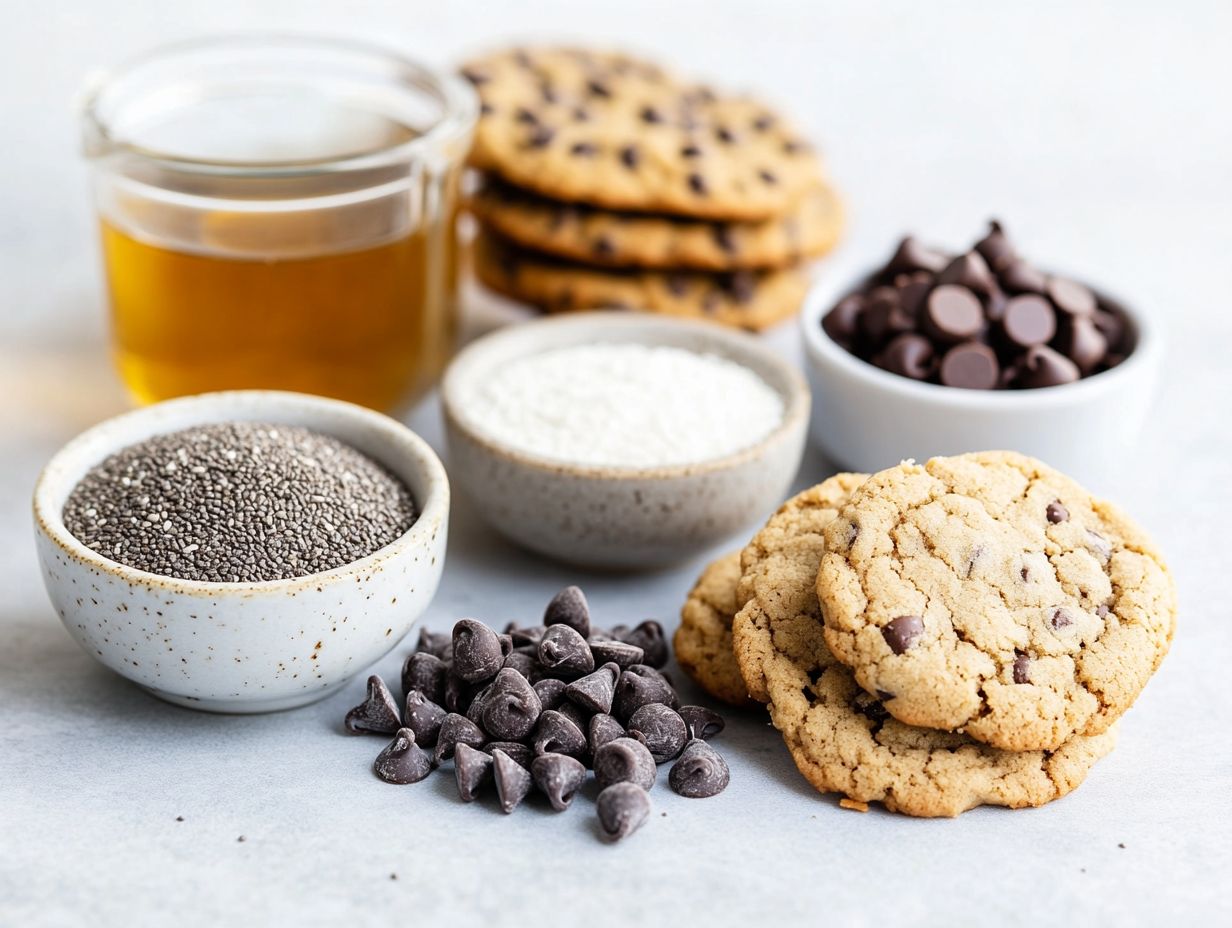
Substituting plant-based ingredients in your traditional cookie recipes can be an effortlessly rewarding endeavor. This allows you to create delicious vegan chocolate chip cookies that honor the essence of the original while catering to your dietary preferences.
Consider adding a bit of cornstarch for a softer texture or mixing in Enjoy Life non-dairy chocolate chips for an extra treat. By embracing alternatives like flax eggs and coconut oil, you can achieve that same rich texture and mouthwatering flavor that has made these treats beloved.
To create your flax egg, simply mix one tablespoon of ground flaxseed with two and a half tablespoons of water, and let it sit for a few minutes until it thickens it’s that easy.
In terms of butter, swapping it for an equal amount of melted coconut oil not only enhances your cookies with a subtle tropical twist but also adds a delicate moisture that complements the other ingredients beautifully.
It s wise to experiment with baking times and keep a vigilant eye on the cookies as they bake. They may require a few extra minutes to achieve that perfect golden-brown finish. Try these substitutions today and enjoy cookies that are both delicious and nutritious!
What Are Some Delicious Plant-Based Cookie Recipes to Try?
If you’re on the hunt for delicious plant-based cookie recipes to elevate your baking game, look no further than vegan chocolate chip cookies and chocolate chip cookie bars! You won t believe how easy it is to whip up these crowd-pleasers that combine simple ingredients to create an easy-to-make treat that s bound to win over hearts and taste buds alike.
These delightful cookies boast a rich, indulgent flavor, all while being completely free of dairy and eggs. This ensures that even those with dietary restrictions can indulge without a second thought. But why stop at classic chocolate chip? Imagine the comforting taste of oatmeal raisin cookies, the satisfying crunch of peanut butter delights, or the seasonal cheer of festive pumpkin spice cookie bars! For even more delicious ideas, check out the top 5 plant-based cookies for office treats! You have a treasure trove of variations waiting to be explored.
What s even better is that these treats are easily customizable to reflect your personal preferences. Feel free to swap out refined sugars for natural sweeteners like maple syrup or agave, or even trade traditional flour for gluten-free alternatives. The versatility of these recipes gives you the power to craft the perfect cookie to satisfy any craving you may have.
What Are Some Tips for Baking with Plant-Based Ingredients?
Baking with plant-based ingredients can transform your kitchen experience into something truly rewarding. By following a few essential tips, you can achieve cookie dough perfection, resulting in vegan cookies that are super tasty, chewy, and bursting with flavor all without sacrificing texture or taste.
To reach this delightful outcome, it s crucial to measure each ingredient with care, as precision plays a pivotal role in your final result. Utilizing kitchen scales for dry ingredients is a smart move, while clear liquid measuring cups will ensure your liquid components are spot on. When it’s time to mix, consider employing a stand mixer or a hand mixer to thoroughly combine your ingredients; just be cautious not to overmix, as that can affect the consistency of your dough.
Pay close attention to baking times, as vegan cookies often bake faster than their traditional counterparts. A slight golden edge is your perfect cue for readiness. These thoughtful adjustments can elevate your baking, transforming simple ingredients into extraordinary treats.
How Can Plant-Based Cookies Be Made More Nutritious?
You can elevate the nutrition of your plant-based cookies by incorporating wholesome ingredients such as nuts, seeds, and whole grains. This means you can indulge in vegan chocolate chip cookies that are not only a delight to your taste buds but also brimming with essential nutrients for a well-rounded snack.
Consider adding chia seeds to your cookie dough; they enrich your recipe with omega-3 fatty acids and fiber, promoting heart health and aiding digestion. Oats are another fantastic option, contributing both bulk and texture while providing a healthy dose of complex carbohydrates for sustained energy.
Incorporating plant-based protein powders, which are simply powders made from plants that are rich in protein, can further enhance the protein content, making your treats more satisfying and perfect for post-workout recovery. By swapping a portion of the flour in traditional recipes with these nutritious ingredients, you can create chewy cookies that maintain their beloved flavor and texture. For a deeper dive into these ingredients, check out the ultimate guide to plant-based cookie ingredients. It’s a delicious reminder that indulgence can absolutely be healthy.
Frequently Asked Questions

The 5 must-try ingredients for plant-based cookies are almond flour, coconut oil, maple syrup, flaxseed meal, and plant-based milk.
Almond flour is a gluten-free and nutrient-dense alternative to traditional flour, providing a rich, nutty flavor and a soft texture to cookies.
Coconut oil contains healthy fats and adds moisture to cookies, making it a great substitute for butter or other oils in plant-based recipes.
Maple syrup is a natural and unrefined sweetener, providing a rich flavor and texture to cookies without the need for processed sugars.
Ready to bake? Gather your ingredients and let the fun begin!
Flaxseed meal is a game-changer in plant-based cookies! It not only helps hold the cookies together but also adds a delicious nutty flavor and boosts nutrition.
Excited to bake? You can use any plant-based milk, like almond, coconut, or oat milk, in your cookies. Pick a milk that enhances the flavors of your cookies!

